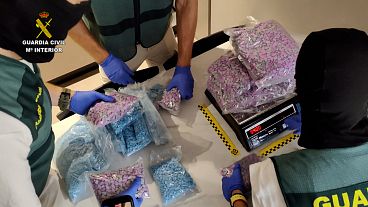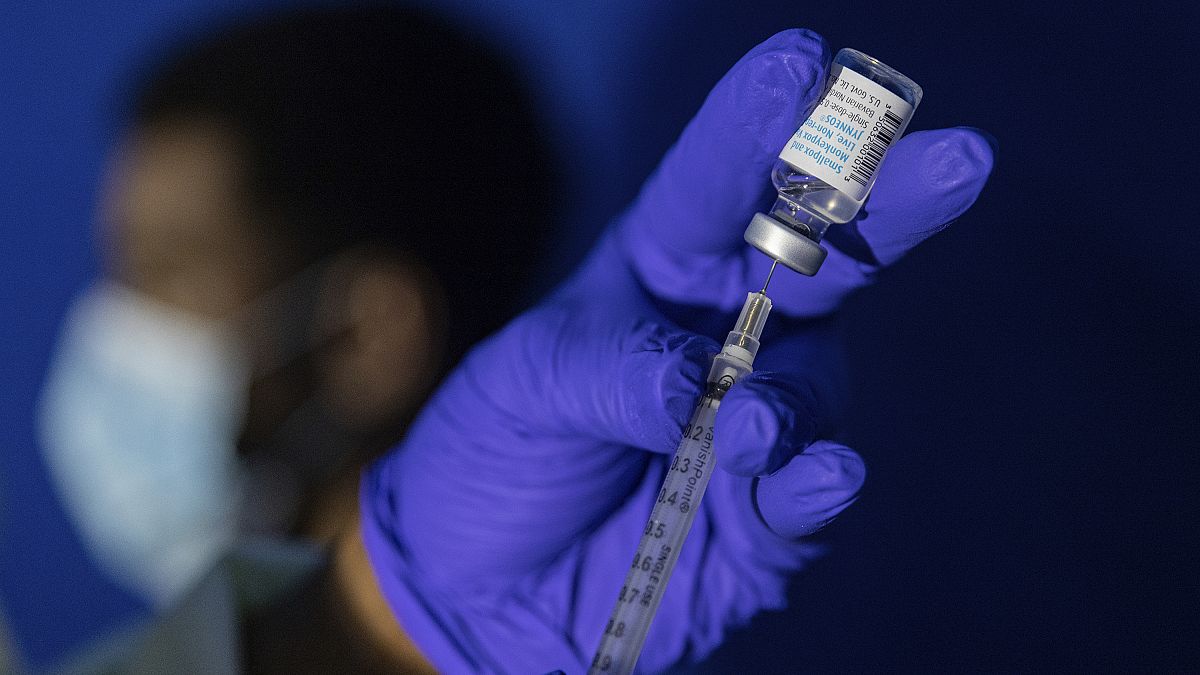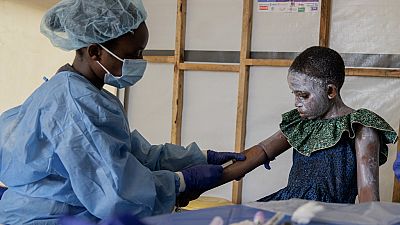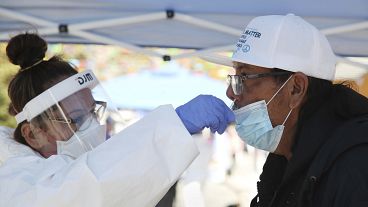The WHO and Africa CDC declared emergencies over the mpox outbreak, as European authorities plan to send more than 175,000 vaccines to the region.
The mpox outbreak ravaging the Democratic Republic of the Congo (DRC) is now a global health emergency, according to the World Health Organization (WHO).
"The detection and rapid spread of a new Clade of mpox in eastern DRC, its detection in neighbouring countries that had not previously reported mpox, and the potential for further spread within Africa and beyond is very worrying," WHO chief Tedros Adhanom Ghebreyesus said on Wednesday after announcing that the mpox outbreak is a public health emergency of international concern (PHEIC), the United Nations’ health agency’s highest alarm.
The WHO said it needs $15 million (€13.6 million) to support Africa’s mpox response, and that it has already released $1.45 million (€1.32 million) from its emergency reserves.
Adhanom Ghebreyesus said the group plans to allocate more funding "in the coming days".
"It's clear that a coordinated international response is essential to stop these outbreaks and save lives," he said.
New mpox strain spreading
Mpox has been endemic in West and Central Africa for decades, but the DRC is now the epicentre of a dangerous new strain that emerged last year and is spreading through sexual and close personal contact.
The strain is an offshoot of the Clade I virus, which has a case fatality rate of about 10 per cent, and has health authorities worried because cases are rising quickly.
Meanwhile, South Africa and Côte d’Ivoire are also grappling with cases of another mpox strain.
More than 14,000 mpox cases and 524 deaths have been reported in at least 13 African countries in 2024, including Burundi, Kenya, Rwanda, and Uganda, which reported their first cases of the new strain in recent weeks.
Officials believe the tally is an undercount due to the lack of testing in the region.
The WHO decision came one day after the Africa Centres for Disease Control and Prevention (CDC) declared that mpox is a continental public health emergency. It’s the first time the African Union’s health agency has made a crisis declaration since it was founded in 2017.
"Mpox has now crossed borders, affecting thousands across our continent, families have been torn apart, and the pain and suffering have touched every corner of our continent," Jean Kaseya, head of the Africa CDC, told reporters on Tuesday.
The emergency decisions "can unlock the capability of countermeasures" such as increased cross-border disease surveillance, diagnostic testing, personnel, and vaccines, Nicaise Ndembi, a senior advisor to the Africa CDC who is working on the mpox response from the DRC, told Euronews Health.
Infectious disease experts have been warning for months that the DRC’s mpox outbreak could become a broader health crisis without more access to diagnostic testing, vaccines, and treatments.
With a fragmented public health infrastructure and little manufacturing capacity on the continent, most African countries have been reliant on donations – fueling concerns that the health inequities of the COVID-19 pandemic will be repeated.
Europe to send mpox vaccines
In response to the mpox outbreak, the European Commission’s pandemic preparedness group said it will send more than 175,000 vaccines to the Africa CDC for distribution.
Danish drugmaker Bavarian Nordic will also donate 40,000 shots on top of 15,000 already pledged.
"Preparedness and response to health threats is a global endeavour which we are determined to pursue collectively and with solidarity across borders," Stella Kyriakides, the European commissioner for health and food safety, said in a statement.
The donated shots will be enough to immunise about 115,000 people, given each vaccination requires two doses, Ndembi said.
The Africa CDC, which estimates it will need at least 2 million vaccines, will dole out the shots based on countries’ population size, how hard they’ve been hit by mpox, and the risk levels for sub-groups within the countries, he said.
People with compromised immune systems due to an advanced HIV infection, for example, are at higher risk of serious illness or death if they get mpox.
Pregnant women and children are also at higher risk. While some people have no symptoms, mpox can cause fever, fatigue, and a rash that turns into painful skin lesions.
"The shots are not going to be enough for all," Ndembi said. "There’s going to be a level of prioritisation".
The WHO called on other countries and international groups to donate shots from their own stockpiles to tackle the shortfall.
Ndembi expects vaccinations to begin in the coming weeks, though the bloc still has to work out logistical hurdles. For example, only two African countries have authorised mpox shots so far, and some don’t have sufficient cold-chain storage to keep the doses safe while on the road.
Mpox now a global concern
African and European health authorities are also working together to expand the region’s access to mpox testing and sequencing, which will help authorities track the virus and tweak their medical interventions, if needed.
The European Commission expects to invest €3.5 million toward the effort this autumn.
A Commission spokesperson declined to provide Euronews Health with more details about its plans.
This is the second time in two years that mpox has posed a global health threat.
The WHO declared a PHEIC over mpox in July 2022, when infections, mainly among gay and bisexual men, were appearing worldwide.
Health authorities in Europe and North America responded with vaccines, treatments, and public health messaging targeted at high-risk communities.
By the time the WHO’s emergency declaration ended in May 2023, about 87,000 mpox cases had been reported in 118 countries. The virus is still circulating at low levels in Europe.
The 2022-2023 global outbreak was tied to the Clade II virus, which is far less deadly than the Clade I viruses in Africa that are now causing international concern.















